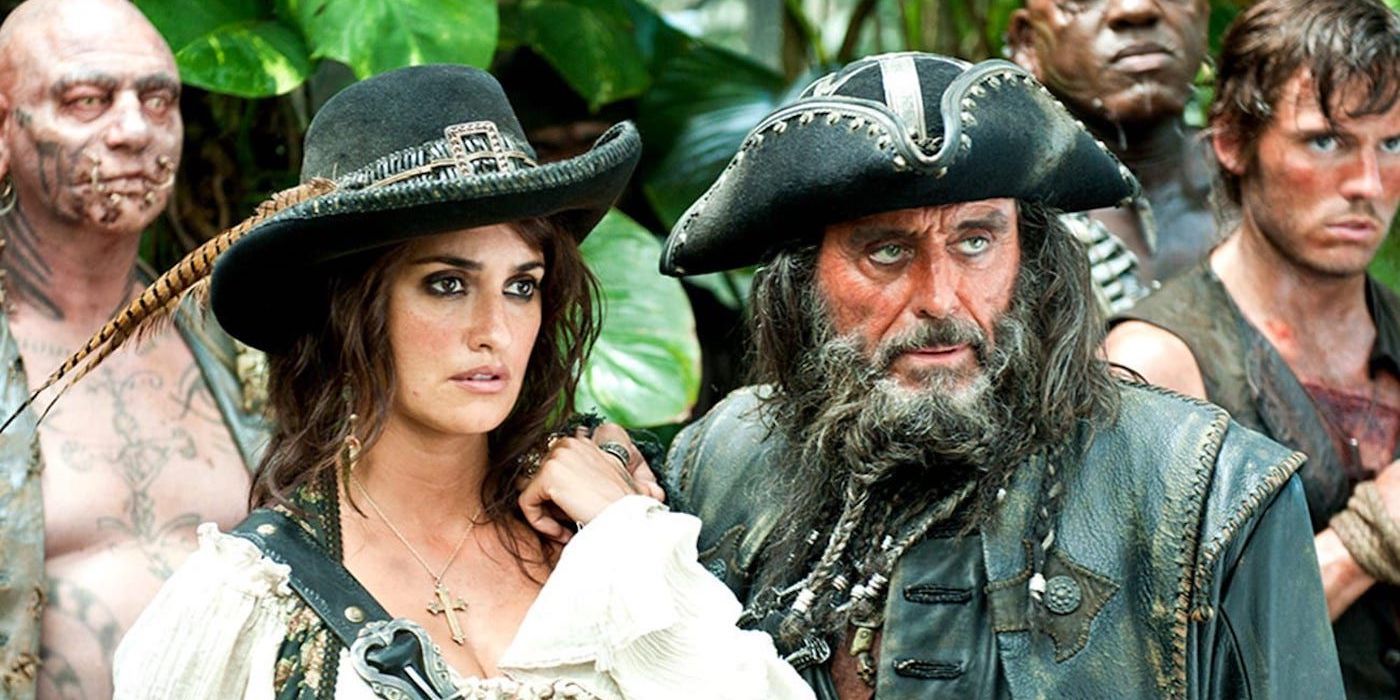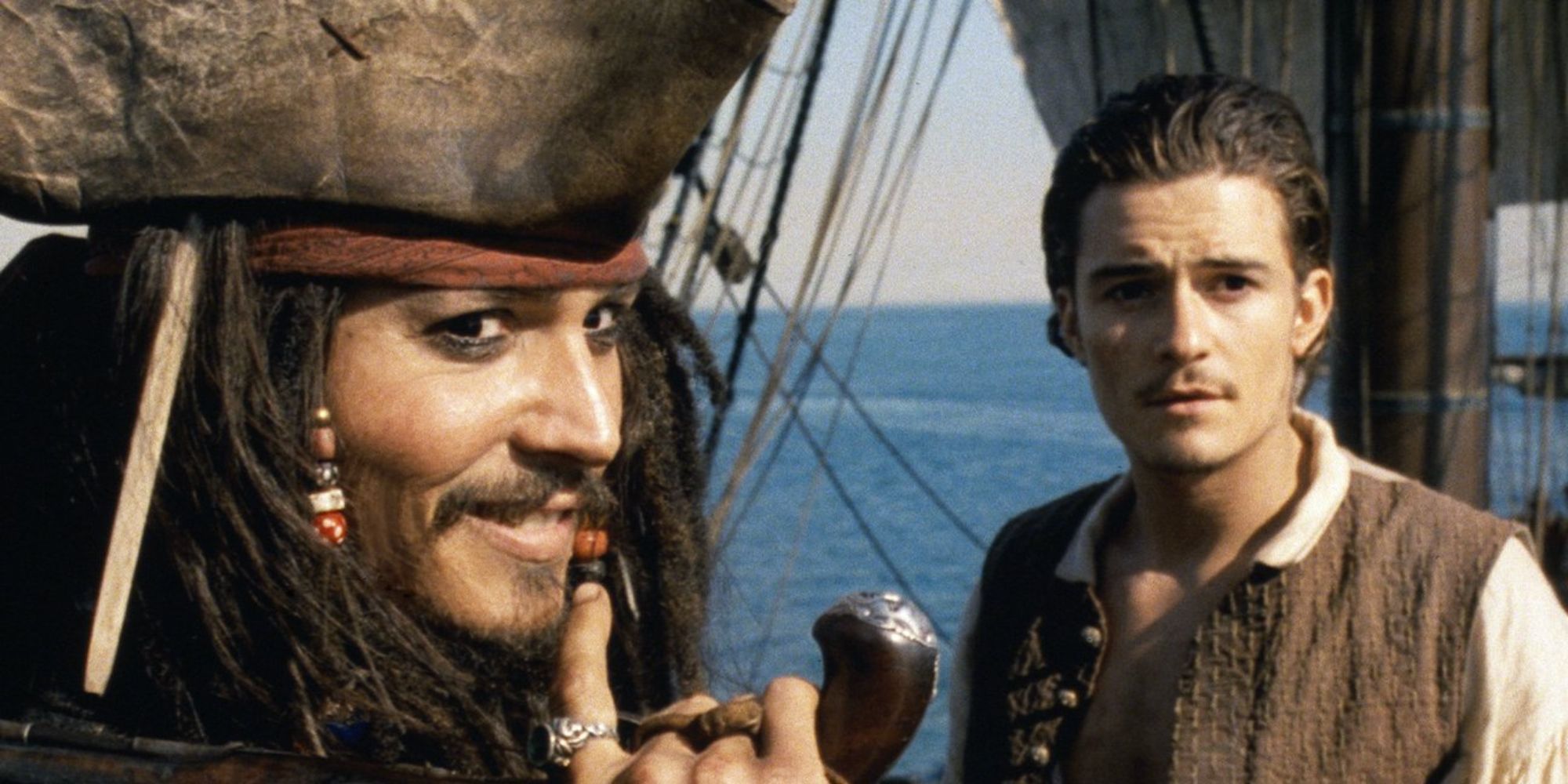No one expected the Pirates of the Caribbean franchise to be a success. The notion of a major studio swashbuckler blockbuster from Disney was ridiculous, as the genre had seemingly died following a series of high-profile flops. Producer Jerry Bruckheimer was experiencing a tough time, and director Gore Verbinski‘s previous credits included the family adventure Mousehunt and the absurd dark comedy The Mexican. A movie based on a theme park ride starring Johnny Depp, mostly an arthouse star at the time, seemed destined for failure.
Yet, against all odds, Pirates of the Caribbean launched one of the 21st century’s biggest blockbuster franchises. Verbsinski brought an epic scope and scale to the first three films, rivaling the ambition of Peter Jackson‘s The Lord of the Rings trilogy and the Wachowski sisters‘ The Matrix saga. The films combined game-changing computer-generated effects, a black sense of humor, and swashbuckling action to create a franchise that felt like no other. The saga’s five movies were highly successful and remain popular among fans. However, some are undoubtedly more rewatchable, whether because of their humor, flawless CGI, character interactions, or a mix of all these elements.
5 ‘Pirates of the Caribbean: On Stranger Tides’ (2011)
Pirates of the Caribbean: On Stranger Tides makes the fundamental mistake of making Jack Sparrow a leading character. The first three films understand Sparrow works best as a supporting player alongside Orlando Bloom’s Will Turner and Keira Knightley’s Elizabeth Swann, whose stories are more emotionally compelling. Pirates of the Caribbean: On Stranger Times attempts to give more insight into Jack’s background by introducing his former flame, Angelica (Penélope Cruz); alas, it fails to make him more compassionate.
Although the film boasted the return of Geoffrey Rush’s Barbossa (who has graduated from piracy to commandeering for the British Empire), the new supporting characters left something to be desired. Director Rob Marshall does add a sense of showmanship that fits well within the Pirates of the Caribbean world, creating some memorable horror-adjacent sequences – including one particularly gruesome use of mermaids. Still, loyal fans might feel comfortable skipping this chapter, by far the weakest in the saga.
4 ‘Pirates of the Caribbean: Dead Men Tell No Tales’ (2017)
Pirates of the Caribbean: Dead Men Tell No Tales understands the mistakes made with Jack’s characterization in the previous film and turns him into the mentor of two younger characters. While theoretically a great idea, the chemistry between the new leads, Henry Turner (Brenton Thwaites) and Carina Smyth (Kaya Scodelario), wasn’t that exciting. The two characters feel like pale imitations of Bloom and Knightley’s roles in the previous trilogy. While Javier Bardem’s Armando Salazar was an interesting new villain, the film’s action sequences didn’t quite capture the sheer lunacy of Verbsinski’s films.
However, Pirates of the Caribbean: Dead Men Tell No Tales makes up for its early mistakes in the third act. The nostalgic return of several returning characters and a few revelations about their bloodlines serve as a proper conclusion to the entire Pirates of the Caribbean franchise.
3 ‘Pirates of the Caribbean: Dead Man’s Chest’ (2006)
Pirates of the Caribbean: Dead Man’s Chest is a much more ambitious film than its predecessor. While the first film had largely been a simple swashbuckling adventure, Dead Man’s Chest had to contextualize the role of pirates within a specific period in Naval History. Jack and his connection with the fearsome immortal warrior Davy Jones (an Oscar-worthy Bill Nighy) became the centerpiece in a larger conflict between pirates and the East India Trading Company, led by the ambitious Lord Cutler Beckett (Tom Hollander).
Nighy’s performance as Jones is one of the best works of motion capture ever brought to the screen. The plot becomes needlessly complicated, introducing Will’s father and featuring a puzzling quasi-romance between Elizabeth and Sparrow. However, Dead Man’s Chest is a crucial entry in the saga, bridging the self-contained story of its predecessor with a new and expansive world, allowing for a larger-than-life finale in the third film.
2 ‘Pirates of the Caribbean: At World’s End’ (2007)
Pirates of the Caribbean: At World’s End ends the trilogy on a high and bombastic note. Combining the political complexity and mythological worldbuilding of Dead Man’s Chest with an epic third act rivaling The Lord of the Rings: The Return of the King, At World’s End is the rare summer blockbuster that justifies its extended runtime. The plot features the conclusion of the ongoing battle between the pirates and the East Trading Company and the conflict against the supernatural captain, Davy Jones.
The film isn’t afraid to get genuinely surreal. The opening sequence, featuring Jack’s crew saving him from Davy Jones’ locker, shows how ambitious and idiosyncratic the series is. Comedy is important to the Pirates of the Caribbean franchise, and At World’s End has it in spades; still, it isn’t afraid to get genuinely emotional, especially with Will and Elizabeth’s romance, the saga’s beating heart. Will’s final sacrifice feels like a satisfying conclusion to his character arc throughout the trilogy while remaining bittersweet.
1 ‘Pirates of the Caribbean: Curse of the Black Pearl’ (2003)
Pirates of the Caribbean: Curse of the Black Pearl may not have the complex worldbuilding of its successors, but it perfectly nails a specific tone unlike any other pirate film. The story centers on young blacksmith Will Turner joining infamous pirate Jack Sparrow on a quest to rescue the beautiful Elizabeth from Captain Barbossa, who stole Sparrow’s ship, the Black Pearl, years earlier.
The film revels in the complexity of its characters and presents a unique version of morality when any character could feasibly switch sides. Barbossa isn’t as much a villain as he is an anti-hero, and Jack is in the same camp, with his actions frequently proving his selfish ways. Placing more traditionally heroic characters like Will and Elizabeth in the exciting world of piracy allows Curse of the Black Pearl to ground its absurd adventure with a genuinely compelling emotional relationship echoing classics like Romancing the Stone.
This content was originally published here.











